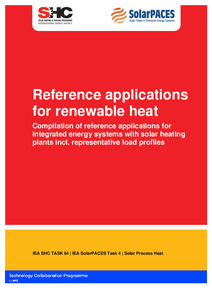Working paper
Reference applications for renewable heat

Reference applications for renewable heat
Compilation of reference applications for integrated energy systems with solar heating plants incl. representative load profiles
(Referenzanwendungen für erneuerbare Wärme)
Abstract
There is a high degree of freedom and flexibility in the way to integrate renewable process heat in industrial processes. Nearly in every industrial or commercial application various heat sinks can be found, which are suitable to be supplied by renewable heat, e.g. from solar thermal, heat pumps, biomass or others. But in contrast to conventional fossil fuel powered heating systems, most renewable heating technologies are more sensitive to the requirements defined by the specific demand of the industrial company. Fossil fuel-based systems benefit from their indifference to process temperatures in terms of energy efficiency, their flexibility with respect to partload as well as on-off operation, and the fuel as a (unlimited) chemical storage. In contrast, the required temperature and the temporal course of the heat demand over the year determine whether a certain regenerative heat generator is technically feasible at all or at least significantly influence parameters like efficiency or coverage rate. Additionally, feasibility and performance of renewable heating systems are also significantly influenced by the availability of heat sources (solar irradiation, ambient heat etc.) which also varies in time. To be able to compare the potential of the coverage and the performance of renewable heating systems globally, first, it is necessary to attain a profound overview of the variety of reference conditions for renewable heating systems.
Additional Information
This is a report from SHC Task 64 / SolarPACES Task IV: Solar Process Heat and work performed in Subtask A: Integrateted Energy Systems. Dleverable Report D.A1Sponsorship
Gefördert vom deutschen Bundesministerium für Wirtschaft und EnergieCitation
@unpublished{doi:10.17170/kobra-202104263730,
author={Pag, Felix and Jesper, Mateo and Jordan, Ulrike},
title={Reference applications for renewable heat},
year={2021}
}
0500 Oax
0501 Text $btxt$2rdacontent
0502 Computermedien $bc$2rdacarrier
1100 2021$n2021
1500 1/eng
2050 ##0##http://hdl.handle.net/123456789/12746
3000 Pag, Felix
3010 Jesper, Mateo
3010 Jordan, Ulrike
4000 Reference applications for renewable heat
:Referenzanwendungen für erneuerbare Wärme / Pag, Felix
4030
4060 Online-Ressource
4085 ##0##=u http://nbn-resolving.de/http://hdl.handle.net/123456789/12746=x R
4204 \$dWorking paper
4170
5550 {{Erneuerbare Energien}}
5550 {{Nachhaltigkeit}}
5550 {{Industrie}}
5550 {{Solarthermie}}
7136 ##0##http://hdl.handle.net/123456789/12746
<resource xsi:schemaLocation="http://datacite.org/schema/kernel-2.2 http://schema.datacite.org/meta/kernel-2.2/metadata.xsd"> 2021-04-28T07:00:11Z 2021-04-28T07:00:11Z 2021-01-25 doi:10.17170/kobra-202104263730 http://hdl.handle.net/123456789/12746 This is a report from SHC Task 64 / SolarPACES Task IV: Solar Process Heat and work performed in Subtask A: Integrateted Energy Systems. Dleverable Report D.A1 Gefördert vom deutschen Bundesministerium für Wirtschaft und Energie eng Urheberrechtlich geschützt https://rightsstatements.org/page/InC/1.0/ Load Profile Renewable Heat Industry 620 Reference applications for renewable heat Working paper There is a high degree of freedom and flexibility in the way to integrate renewable process heat in industrial processes. Nearly in every industrial or commercial application various heat sinks can be found, which are suitable to be supplied by renewable heat, e.g. from solar thermal, heat pumps, biomass or others. But in contrast to conventional fossil fuel powered heating systems, most renewable heating technologies are more sensitive to the requirements defined by the specific demand of the industrial company. Fossil fuel-based systems benefit from their indifference to process temperatures in terms of energy efficiency, their flexibility with respect to partload as well as on-off operation, and the fuel as a (unlimited) chemical storage. In contrast, the required temperature and the temporal course of the heat demand over the year determine whether a certain regenerative heat generator is technically feasible at all or at least significantly influence parameters like efficiency or coverage rate. Additionally, feasibility and performance of renewable heating systems are also significantly influenced by the availability of heat sources (solar irradiation, ambient heat etc.) which also varies in time. To be able to compare the potential of the coverage and the performance of renewable heating systems globally, first, it is necessary to attain a profound overview of the variety of reference conditions for renewable heating systems. open access Referenzanwendungen für erneuerbare Wärme Pag, Felix Jesper, Mateo Jordan, Ulrike 11 Seiten Kassel, Universität Kassel, Fachbereich Maschinenbau, Fachgebiet Solar- und Anlagentechnik 03ETW014A Erneuerbare Energien Nachhaltigkeit Industrie Solarthermie Compilation of reference applications for integrated energy systems with solar heating plants incl. representative load profiles publishedVersion false </resource>
The following license files are associated with this item:
Urheberrechtlich geschützt

